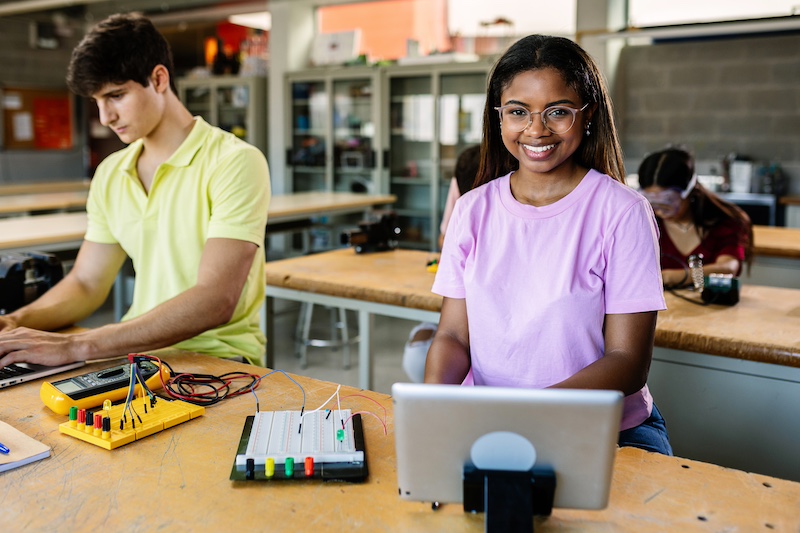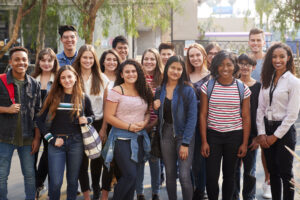Performing research in high school is a difficult thing, but there are many options available to students willing to look for them. We’ve discussed how this can be done before, from finding summer internships to undertaking your own research projects. In this article, we’re going to go over another opportunity for students to participate in research: the Aspiring Scholars Directed Research Program (ASDRP).
In this article, we’re going to cover what the ASDRP is, how it works, who it’s for, and whether or not it’s a good choice for you. We’ll also give you some advice on how you can find other opportunities like the ASDRP to get involved with research as a high school student. Let’s get started!
What the ASDRP is
Founded and hosted in the Bay Area, ASDRP is a non-profit which works with high school students interested in pursuing research. They specifically aim to work with students who are underrepresented in STEM or who come from an economically disadvantaged background.
Students work with research mentors on ongoing and individual projects. Like any other functioning research lab, the point of ASDRP is to ask pointed questions and to do trials to determine the answer. They perform research in the following disciplines:
- Chemistry
- Biology
- Computational Modeling
- Computer Science
- Biomedical
- Astrophysics
Students have access to ASDRP’s facilities to perform their research. The cost of the program varies; it does cost money to run a research laboratory, and student fees reflect that, with costs of up to $1,070. There is significant financial aid available for students who need it however. While most students take part in the program in-person, students not local to the Bay Area may participate remotely.
Students are able to publish and present their work internally, in research presentations put on by ASDRP. Many also work to get their research published by other journals, to make their results more broadly known. Finally, the program follows up with alumni to help them find places in university laboratories after their time with ASDRP is done.
ASDRP is a quarterly program, with students committing to slightly over two months of work on their research projects. They have sessions in spring, summer, and fall. This is all done in-person.
How to Join the ASDRP
Applications to the ASDRP are handled online. The majority of applicants come from the Bay Area; though there are those who apply from other states as well. Being from the Bay Area is not required, but given that the program works best in person and that housing is not provided, it makes sense that the bulk of the students who participate are local to the program.
The number of spaces available, and thus the acceptance rate, varies greatly from term to term, as new students are accepted as prior students graduate, freeing up spaces. The application for summer is more competitive, as it is far more popular, receiving significantly more applicants. Note too that each application period has both regular and early deadlines; your chances of acceptance are far greater when applying early, as there are more spaces free and fewer competitors for them.
If you are currently doing research at ASDRP, you do not need to reapply to continue doing this research. If you leave for a term and then wish to come back, you will need to reapply.
You must be currently in high school to apply to ASDRP. They do not look for prior research experience, but for passion and rigor on the part of students who apply. Letters of recommendation are not required (though a supplemental one may be submitted), and standardized test scores are not required.
The contents of the application itself are the most important part, specifically their essay questions. They ask you to answer the following questions; note that none of these have a word limit, either maximum or minimum. Our suggestion is to use a few hundred words to answer each; you want to provide a thorough and detailed answer, without overwhelming them with needless filler. Not all of the questions are required (though we do recommend answering all of them), those which are not we will mark as optional.
- Why are you applying for the Aspiring Scholars Directed Research Program? Why do you want to commit a large chunk of your time to doing scientific research? What questions or fields in science and engineering interest you, and why? What do you hope to do in STEM, at the Aspiring Scholars Directed Research Program and beyond?
- Please discuss any previous science/math/computer science coursework (either at school or in another setting, such as summer programs or online classes). Please include your grades in these courses, if applicable. Please provide explanations for any grades that you think are not representative of your true potential (we recognize that grades are not always a good reflection of one’s scientific ability).
- If you have any other experience in STEM (such as clubs or volunteering) that you wish to discuss, please do so here.
- How would you contribute diversity to STEM (science, technology, engineering, mathematics)? (Diversity is broadly defined)
- Do you have any hands-on science experience or laboratory research experience? If so, please provide a detailed discussion of what you did, with whom you worked, what your specific tasks were, what you accomplished, etc.
- Please list out ALL coursework and extracurricular activities (including extracurricular programs, tutoring, SAT prep, clubs, sports, music, dance, boy/girl scouts, etc.) that you may possibly engage in during the 2024-2025 academic year. Include an average weekly time estimate for each. Please be very careful and ensure that you list ALL commitments you may possibly have. If you are not sure if you will have that commitment, please say so.
- Optional: If you have a strong preference for a particular research advisor, field, or project; please indicate so. (optional) Please note that students are matched to research fields and advisors based on the strength of their application.
They also have the following options to upload documents:
- Any prior research experience (up to three files). Note that this is optional, and not required or expected.
- A transcript, either official or unofficial.
- You may optionally upload a resume.
So this is a lot of questions, but that makes sense. The program wants to get a good sense of who you are and what you’ve accomplished, and in so doing see if you are a good fit for what they are trying to accomplish with their program. There are no explicitly right answers to these questions; instead, you should try to show off your passion for science and research, and demonstrate the skills you currently have that could help you pursue it.
Should You Join the ASDRP?
Maybe. If you’re based in the Bay Area, and have a strong interest in science and research, then this is an excellent opportunity, and we strongly recommend pursuing it. If you are not located in the Bay Area however, it may not be the best option available to you.
The best part of programs like this is the opportunity for students to take part in hands-on research, working in a laboratory setting alongside professionals, learning the techniques that they simply don’t have the time or resources to teach in high school. While you can still get some excellent research experience and learn a lot participating in this program virtually, it will not offer the same experience as doing so in person.
This doesn’t mean that ASDRP should be limited to students in the Bay Area, but rather that if you are outside their proximity, you should consider looking for research opportunities closer to you as well, so you can get the full experience.
How to Find Lab Opportunities in High School
So what should you do if you’re interested in participating in a program like ASDRP, but live nowhere near the Bay Area? Find one near you!
Of course, this is easier said than done, so we’ll give you the steps we use to help our students find lab opportunities and internships, and gain valuable research experience in high school.
First, determine what likely opportunities in your area are. Research labs are generally run by four different kinds of organizations:
- Colleges and Universities
- Private Companies
- Hospitals and Medical Facilities
- Government Agencies
These are not mutually exclusive of course; many hospitals are associated with universities, the government partners with everybody, and joint approaches to make use of shared resources are common. Once you have identified what labs are near you, you can order them by how likely they are to have the kind of program you want. Here is the general approach:
- Universities and teaching hospitals. These organizations already exist to instruct students, so offering opportunities for high school students is quite common.
- Hospitals not attached to universities. These are slightly less likely, but they still do significant medical research, and may welcome the chance to help students find their footing in the sciences.
- Government agencies. This depends a lot on the agency and what their particular lab is doing; the government is unlikely to let high schoolers into a nuclear power plant for instance.
- Private companies. Companies exist to make money, and teaching high school students usually doesn’t do that. There are exceptions of course.
Next you should search each organization in turn for the opportunities they offer to students. Colleges may have one unified page of these opportunities, or may list them out separately by department. Once you find a likely opportunity, read it thoroughly to see what it actually offers you, and if it aligns with your goals.
There will not be these opportunities everywhere; students based in metro centers and near large research universities have a slightly easier time finding lab openings near them. We do hope that these instructions help you in finding opportunities of your own however.
Final Thoughts
The chance to conduct original research in high school is remarkable, especially when you get access to a full laboratory facility, and learn techniques from experts. ASDRP is one such opportunity, though not the only one, and we hope that this article has given you a solid introduction to what it can offer, and how you can avail yourself of their resources.
Of course, these programs are often quite competitive, and can be difficult to locate. If you are looking for specific advice on how to apply to one of these programs, or need help finding one in your area, schedule a free consultation with us today. We have a long experience working with students to find and master their passions in our Candidacy Building program, and are always happy to hear from you.








